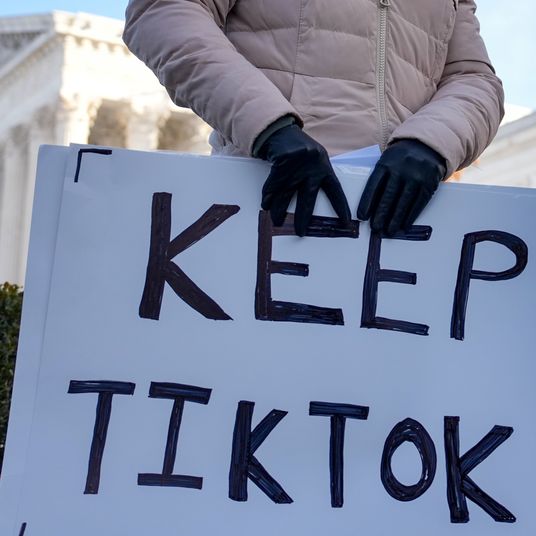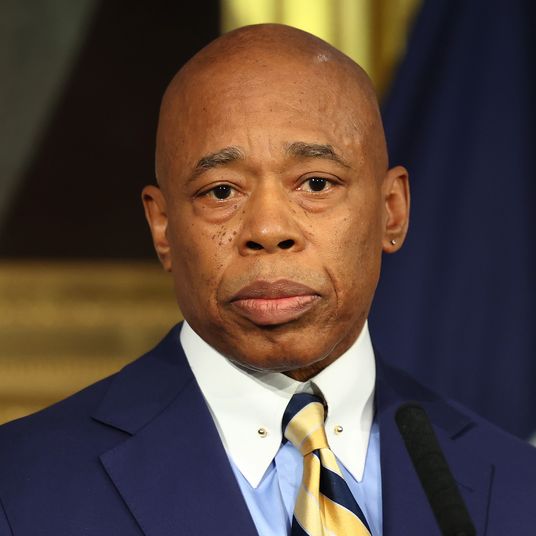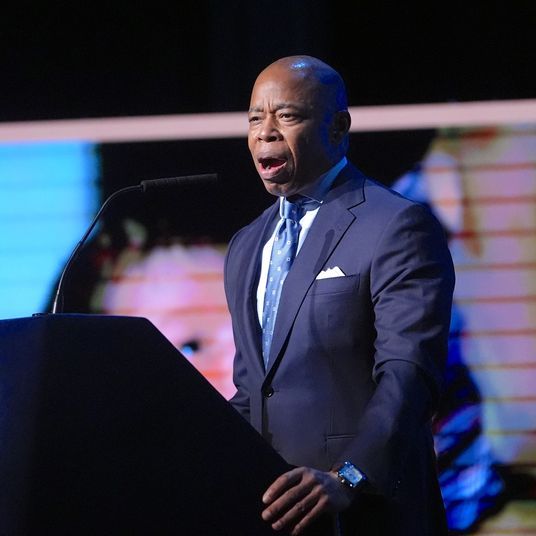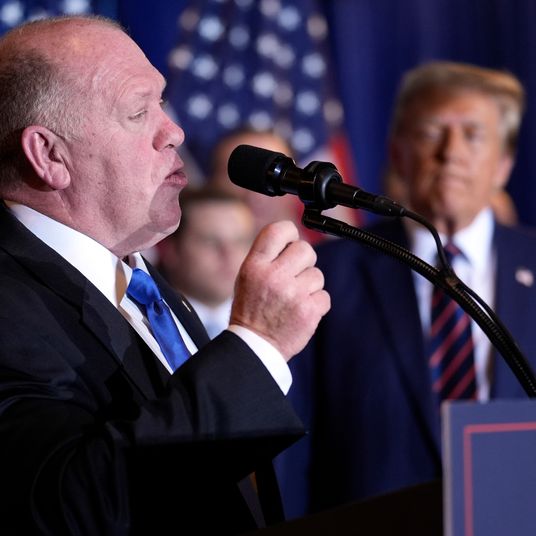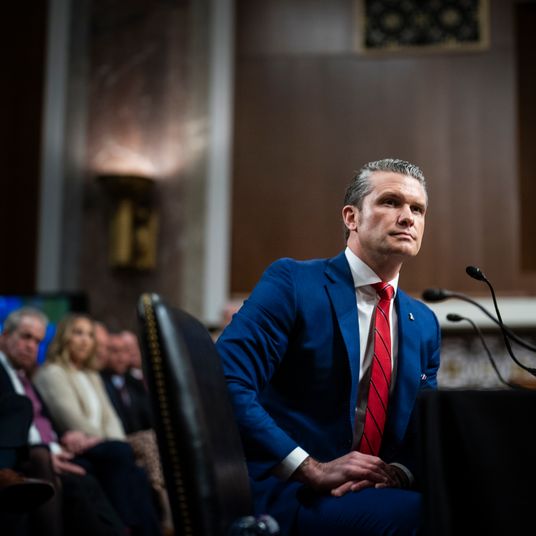
This article was featured in One Great Story, New York’s reading recommendation newsletter. Sign up here to get it nightly.
As far as Pete Hegseth’s nomination for secretary of Defense goes, Senator Joni Ernst was the ball game, and it was over in the second inning. Given her years of advocacy on behalf of women in the military and against sexual assault, Ernst was understood to be the only roadblock to Hegseth’s confirmation, and she capitulated instantly. She did not even bother to playact rigor in her questioning of Hegseth, who has been accused of rape and creating a hostile work environment for women and has called for women to be banned from combat roles in the military. There was no acknowledgment that this man’s record was an affront to the issues she has built her reputation on; instead, after the hearing, she and a Des Moines radio reporter joked about “breaking news” that she would vote for Hegseth.
Hegseth’s glide path to the top of the Pentagon, despite his being hideously unfit for the office, has contributed to a sense of inevitability in Washington, D.C., as it prepares for a week of inauguration festivities, replete with a Crypto Ball and billionaires from across various industries paying tribute to Donald Trump. Among them will be Facebook’s Mark Zuckerberg, who has recently spoken of the need for more “masculine energy” in corporate America, a sentiment that was everywhere in Hegseth’s hearing as well. There was a steady drumbeat from Hegseth and his committee supporters on the physical differences between men and women and how difficult it is for women to carry heavy loads and run long distances. The vision of a soldier — or “war fighter,” as Hegseth relentlessly referred to them — was clearly masculine, and one of the final questions he got was how many push-ups he could do. He’d done five sets of 47 that morning, he replied proudly, an obsequious nod to the 47th president of the United States, the improbable Ur–alpha male atop MAGA’s mountain of alpha males.
All this peacocking was a show of domination meant to quell dissent, to make people give up, to get them to show Trump “anticipatory obedience,” as residual denizens of the resistance have described the various systems folding to his rule. Which is why it was notable, heartening even, that the Democrats showed up on Tuesday unwilling to submit, even as they faced an all but hopeless task.
Senator Tim Kaine of Virginia, in particular, went after Hegseth hard, seemingly laying the groundwork for anyone out there who might still be brave enough to step forward to challenge this formidable pantomime of unchecked brawn. Kaine quizzed Hegseth about his history of infidelity, which is not a crime or an impediment to holding high office. But as he laid out his carefully constructed set of questions, it became clear that Kaine was teasing out a pattern of dishonesty. It was perhaps the only time that Hegseth appeared a little rattled, as Kaine pressed him on whether he had committed sexual assault, whether he had broken marriage vows, whether he had ever been violent toward a spouse, whether he would release his first and second wives from nondisclosure agreements, and whether he had come clean to Trump about his alleged previous transgressions.
His evasive responses to Kaine — as well as to other Democrats on the committee, whose questions about alleged assault and public drunkenness and financial mismanagement he brushed aside with indignant yelps of “Anonymous smear!” — mean that if a colleague or an ex or accuser did come forward with allegations about impropriety or violent behavior, it would put a human face to those anonymous or NDA’d claims, put Hegseth’s opacity on display, and perhaps force Republicans to revisit these questions. It could also provide the impetus for further FBI investigation.
An aide from a senator’s office told me that the FBI check could be extended for the sake of the FBI’s “client,” in this case Trump’s transition team. “If there are major problems in an individual’s background,” they said, “they can get blackmailed by China, Russia. That’s a national security threat. It’s one thing if the transition team learns the information and says, ‘That’s okay, we want to take that risk.’ But for them to continue to be in the dark, you don’t want to keep finding little surprises.”
In the hours after the hearing, Senator Mark Kelly told me, “Maybe some people watched this hearing. Maybe they were the person that carried him out of the party bus, and when he gave a nonanswer, they might put their hand up and say, ‘Hey, that was me. I did that. He’s not being transparent.’ I think that’s a possibility.” Multiple people attached to the Armed Services Committee told me that there has been contact with some people the FBI elected not to follow up with.
Still, Kelly guessed that there was a “95 percent chance” that Hegseth will get confirmed. And it is very unlikely that anyone will come forward in the days before the full Senate votes on Hegseth’s nomination, because after Christine Blasey Ford, the anxiety for civilians to speak up is that much higher, exacerbated by an atmosphere in which Trump, Elon Musk, and right-wing media figures feel comfortable openly threatening Republican politicians who fail to back his nominees. “It’s really terrifying, the environment they’re trying to create to prevent people from coming forward,” one Senate aide told me. “It’s so tough for people who think this is someone who will fundamentally endanger this country because he’s so unqualified but are also worried about getting doxxed, getting threats. We are creating a system where we have no real protections.”
The undercurrents of menace at the hearing were largely ignored by Washington’s pundits, many of whom are recalibrating their position toward Trump and encouraging people to accept the new reality he represents. David Brooks of the New York Times complained that Democrats failed to focus on “life-or-death issues” surrounding counterterrorism and warfare, instead choosing to play “culture war games.” He added, “With Democrats’ having failed to defeat Donald Trump with this strategy, I admire their capacity for persistent losing.”
Abdication is, of course, what Trump and Hegseth wanted from the hearing, which was full of not-so-veiled threats and intimidation. Take, for example, Hegseth’s refusal to answer whether he would carry out an order from the president to shoot protesters in the legs. “Sounds to me like you would shoot protesters in the legs,” Senator Mazie Hirono commented drily in response to his stonewalling. Whether or not Hegseth would in fact give such a command is almost beside the point: The implication that he might is what is meant to put a shiver down the spine of those who would protest this administration or any of its heavies.
Hegseth bucked against the very idea that there should be any restrictions on men like him, whether those restrictions protected against racial or gendered inequality, obligated the nominee to meet with Democratic members of the committee that was vetting him, or punished “war fighters” for illegal behaviors like waterboarding. Senator Angus King, an independent, cited a passage from one of his books in which Hegseth argued that soldiers “should not fight by rules written by dignified men in mahogany rooms 80 years ago,” a seeming reference to the Geneva Conventions, which banned torture and classified certain kinds of military violations as war crimes. Hegseth’s mission, he repeated regularly, was to restore a “warrior ethos” to the military.
“Men and women in air-conditioned offices like to point fingers at people in dark and dangerous places,” Hegseth said during his testimony, part of an effort undertaken by the nominee and his Republican cheerleaders to portray anything that smacked of inclusion or diversity — not just reviled DEI initiatives but the very notion that those who are not straight white men might have a right to participate equally in realms where they had once been unwelcome — as effeminate, enfeebling. Hegseth cast himself, in contrast, as someone with “dust on his boots,” a reference to his military service, which does not in fact set him apart from many of the people who have both upheld and been protected by the Geneva Conventions or who were challenging him from the Democratic side of the dais. But that didn’t matter. Perhaps unsurprisingly for someone who views gay and female and trans servicemembers as threats, any rule or repercussion that would limit a man’s abilities to act as he pleases was cast as “weak and woke.” “This is not academic for me,” Hegseth said at one point. “This is my life.”
Yet for all this flaunting of their might, Hegseth and his Republican backers also cast themselves as the helpless victims of this effete mob. Senator Dan Sullivan of Alaska described being freed from the “Biden woke yoke,” while Hegseth said that the “troops would rejoice” upon being liberated from diversity-and-inclusion requirements. The very fact that Democrats were asking Hegseth questions was portrayed as persecution. “I’m sorry for what has been happening to you,” said Senator Kevin Cramer. “Particularly that you should have to sit there and answer hypothetical potential, in somebody’s imagination, crimes that may take place at some point and wouldn’t that disqualify you if you were a murderer, or if you were a rapist — unfair, unfair. And I’m embarrassed for this behavior.”
Underneath all the bravado was a bright seam of fear. When Hegseth refused to answer Senator Elissa Slotkin’s question of whether he would stand in the breach against a president who ordered him to betray the Constitution, she shot at him, “What are you scared of?” He responded, “I’m not scared of anything, Senator.” But this was just another lie. Hegseth is scared — not only of Donald Trump but of losing his job over revelations about the alleged rape, of living in a world where men like him cannot act with impunity.
As we head into this next administration, millions of people feel exactly what Trump and his party want them to feel: petrified and helpless. That is why Trump nominated such an embarrassing candidate for Defense — to make a spectacle of his power, of his ability to ram Hegseth through anyway. Why is this pageant so necessary? After all, if the Republicans really do own the libs now, they wouldn’t have to work so hard to show it.
Consider that, alongside its victories, the right has suffered big defeats too. Powerful men who thought themselves invincible lost jobs and reputations during Me Too. Anti-abortion activists have lost referendum after referendum. Trump himself lost an election in 2020, and Republicans lost big in 2018 and 2022. Go back further, and you have the very losses of power they are fighting so strenuously to reverse, victories extracted by the movements for civil rights and women’s rights and gay rights. Decades later, rich white patriarchs are still building entire psychodramas around the degree to which they have been wounded by those defeats.
And for all their blustering showmanship, they are scared they might lose again. Republicans want their opponents to believe that resistance is futile. They want to break the rules in order to break the spirit of the opposition, not just on foreign battlefields, but here at home. Because what the right understands is something that the left is going to have to relearn in coming weeks and months and years: It is only if we don’t fight that they truly win.
More on Trump's Cabinet
- Trump Cabinet Confirmation Hearings: Schedule & How to Watch
- Republicans Salute Hegseth at Confirmation Hearing
- Pete Hegseth Is a Test







